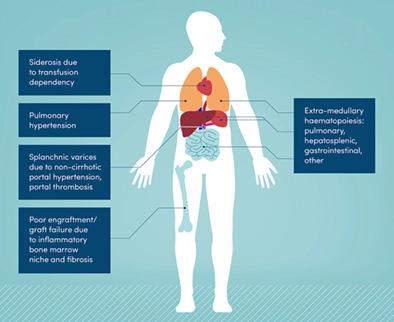当前位置:
X-MOL 学术
›
Am. J. Hematol.
›
论文详情
Our official English website, www.x-mol.net, welcomes your
feedback! (Note: you will need to create a separate account there.)
Innovative strategies to improve hematopoietic stem cell transplant outcomes in myelofibrosis
American Journal of Hematology ( IF 10.1 ) Pub Date : 2022-07-08 , DOI: 10.1002/ajh.26654 Jacinta Perram 1, 2 , David M Ross 3, 4 , Donal McLornan 5 , Krisstina Gowin 6 , Nicolas Kröger 7 , Vikas Gupta 8 , Clinton Lewis 9 , Nico Gagelmann 7 , Nada Hamad 1, 2, 10
American Journal of Hematology ( IF 10.1 ) Pub Date : 2022-07-08 , DOI: 10.1002/ajh.26654 Jacinta Perram 1, 2 , David M Ross 3, 4 , Donal McLornan 5 , Krisstina Gowin 6 , Nicolas Kröger 7 , Vikas Gupta 8 , Clinton Lewis 9 , Nico Gagelmann 7 , Nada Hamad 1, 2, 10
Affiliation

|
Myelofibrosis (MF) is a clonal myeloproliferative neoplasm characterized by inflammation, marrow fibrosis, and an inherent risk of blastic transformation. Hematopoietic allogeneic stem cell transplant is the only potentially curative therapy for this disease, however, survival gains observed for other transplant indications over the past two decades have not been realized for MF. The role of transplantation may also evolve with the use of novel targeted agents. The chronic inflammatory state associated with MF necessitates pretransplantation assessment of end-organ function. Applying the transplant methodology employed for other myeloid disorders to patients with MF fails to acknowledge differences in the underlying disease pathophysiology. Limited understanding of the causes of poor transplant outcomes in this cohort has prevented refinement of transplant eligibility criteria in MF. There is increasing evidence of heterogeneity in molecular disease grade, beyond the clinical manifestations which have traditionally guided transplant timing. Exploring the physiological consequences of disease chronicity unique to MF, acknowledging the heterogeneity in disease grade, and using advanced prognostic models, molecular diagnostics and other organ function diagnostic tools, we present an innovative review of strategies with the potential to improve transplant outcomes in this disease. Larger, prospective studies which consider the impact of molecular-based disease grade are needed for MF transplantation.
中文翻译:

改善骨髓纤维化造血干细胞移植结果的创新策略
骨髓纤维化 (MF) 是一种克隆性骨髓增生性肿瘤,其特征是炎症、骨髓纤维化和母细胞转化的固有风险。造血同种异体干细胞移植是这种疾病唯一可能治愈的疗法,然而,在过去二十年中观察到的其他移植适应症的生存获益尚未在 MF 中实现。移植的作用也可能随着新型靶向药物的使用而发展。与 MF 相关的慢性炎症状态需要对终末器官功能进行移植前评估。将用于其他骨髓疾病的移植方法应用于 MF 患者未能承认潜在疾病病理生理学的差异。对该队列中移植结果不佳的原因的了解有限,阻碍了 MF 移植资格标准的改进。越来越多的证据表明,分子疾病分级的异质性超出了传统上指导移植时机的临床表现。探索 MF 特有的慢性疾病的生理后果,承认疾病分级的异质性,并使用先进的预后模型、分子诊断学和其他器官功能诊断工具,我们对可能改善该疾病移植结果的策略进行了创新回顾. MF 移植需要考虑基于分子的疾病分级的影响的更大规模的前瞻性研究。越来越多的证据表明,分子疾病分级的异质性超出了传统上指导移植时机的临床表现。探索 MF 特有的慢性疾病的生理后果,承认疾病分级的异质性,并使用先进的预后模型、分子诊断学和其他器官功能诊断工具,我们对可能改善该疾病移植结果的策略进行了创新回顾. MF 移植需要考虑基于分子的疾病分级的影响的更大规模的前瞻性研究。越来越多的证据表明,分子疾病分级的异质性超出了传统上指导移植时机的临床表现。探索 MF 特有的慢性疾病的生理后果,承认疾病分级的异质性,并使用先进的预后模型、分子诊断学和其他器官功能诊断工具,我们对可能改善该疾病移植结果的策略进行了创新回顾. MF 移植需要考虑基于分子的疾病分级的影响的更大规模的前瞻性研究。并使用先进的预后模型、分子诊断学和其他器官功能诊断工具,我们对可能改善这种疾病移植结果的策略进行了创新回顾。MF 移植需要考虑基于分子的疾病分级的影响的更大规模的前瞻性研究。并使用先进的预后模型、分子诊断学和其他器官功能诊断工具,我们对可能改善这种疾病移植结果的策略进行了创新回顾。MF 移植需要考虑基于分子的疾病分级的影响的更大规模的前瞻性研究。
更新日期:2022-07-08
中文翻译:

改善骨髓纤维化造血干细胞移植结果的创新策略
骨髓纤维化 (MF) 是一种克隆性骨髓增生性肿瘤,其特征是炎症、骨髓纤维化和母细胞转化的固有风险。造血同种异体干细胞移植是这种疾病唯一可能治愈的疗法,然而,在过去二十年中观察到的其他移植适应症的生存获益尚未在 MF 中实现。移植的作用也可能随着新型靶向药物的使用而发展。与 MF 相关的慢性炎症状态需要对终末器官功能进行移植前评估。将用于其他骨髓疾病的移植方法应用于 MF 患者未能承认潜在疾病病理生理学的差异。对该队列中移植结果不佳的原因的了解有限,阻碍了 MF 移植资格标准的改进。越来越多的证据表明,分子疾病分级的异质性超出了传统上指导移植时机的临床表现。探索 MF 特有的慢性疾病的生理后果,承认疾病分级的异质性,并使用先进的预后模型、分子诊断学和其他器官功能诊断工具,我们对可能改善该疾病移植结果的策略进行了创新回顾. MF 移植需要考虑基于分子的疾病分级的影响的更大规模的前瞻性研究。越来越多的证据表明,分子疾病分级的异质性超出了传统上指导移植时机的临床表现。探索 MF 特有的慢性疾病的生理后果,承认疾病分级的异质性,并使用先进的预后模型、分子诊断学和其他器官功能诊断工具,我们对可能改善该疾病移植结果的策略进行了创新回顾. MF 移植需要考虑基于分子的疾病分级的影响的更大规模的前瞻性研究。越来越多的证据表明,分子疾病分级的异质性超出了传统上指导移植时机的临床表现。探索 MF 特有的慢性疾病的生理后果,承认疾病分级的异质性,并使用先进的预后模型、分子诊断学和其他器官功能诊断工具,我们对可能改善该疾病移植结果的策略进行了创新回顾. MF 移植需要考虑基于分子的疾病分级的影响的更大规模的前瞻性研究。并使用先进的预后模型、分子诊断学和其他器官功能诊断工具,我们对可能改善这种疾病移植结果的策略进行了创新回顾。MF 移植需要考虑基于分子的疾病分级的影响的更大规模的前瞻性研究。并使用先进的预后模型、分子诊断学和其他器官功能诊断工具,我们对可能改善这种疾病移植结果的策略进行了创新回顾。MF 移植需要考虑基于分子的疾病分级的影响的更大规模的前瞻性研究。











































 京公网安备 11010802027423号
京公网安备 11010802027423号